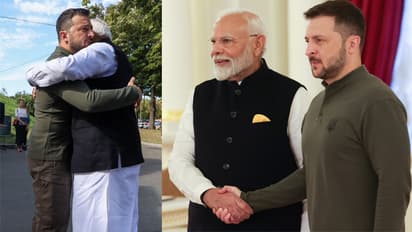Ukraine's Zelenskyy proposes peace summit in India amid escalating war with Russia: Report

Synopsis
Ukrainian President Volodymyr Zelenskyy has reportedly proposed a high-profile summit in India aimed at advancing peace negotiations with Russia.
Ukrainian President Volodymyr Zelenskyy has proposed a high-profile summit in India aimed at advancing peace negotiations with Russia, according to a Bloomberg report quoting sources familiar with the discussions.
This proposal was reportedly conveyed to Indian Prime Minister Narendra Modi during his visit to Ukraine last week. The initiative seeks to build on a previous summit held in June, which aimed to rally support from Global South nations for Ukraine in its ongoing conflict with Russia.
The proposed summit in India is seen as a potential step forward for Kyiv, as it represents an opportunity to broaden international support. However, India’s involvement remains tentative, given its reservations about the exclusion of Russia from the peace initiative.
Despite PM Modi’s recent statements expressing support for Ukraine's sovereignty, he has not yet committed to hosting the proposed summit.
The urgency of the diplomatic effort has increased with recent developments on the ground. Russian forces have made significant gains in Ukraine's eastern Donetsk region, while Ukraine's military has launched a surprising incursion into Russia’s Kursk region. These moves highlight the ongoing and escalating nature of the conflict, which began with Russia’s invasion of Ukraine in February 2022.
Zelenskyy’s proposal reflects Ukraine's broader strategy to garner global backing for its ten-point peace plan, which includes demands for a complete withdrawal of Russian forces and international isolation of Russia prior to direct negotiations.
However, many Global South countries have insisted that any peace forum must include Russia in the discussions. Ukraine has expressed a willingness to involve Russia in the peace process, but Moscow has consistently rejected Kyiv's proposed framework.
The June summit, hosted by Switzerland and attended by over 100 countries and organizations, failed to achieve its goal of securing widespread global support.
Key nations such as China did not participate, and India, along with Indonesia and South Africa, declined to endorse the final communique.
Zelenskyy’s recent discussions with Modi included a request for India’s endorsement of the communique, emphasizing that the host of a subsequent summit should have supported the initial document.
India’s hesitation stems from its stance that a viable solution to the conflict requires dialogue directly between the involved parties. During his visit to Kyiv, PM Modi underscored his support for Ukraine's territorial integrity but reiterated that diplomatic engagement is the only viable path to peace.
India has maintained its political and economic ties with Russia, which provides India with affordable oil and military supplies. Modi’s visit to Kyiv followed a trip to Moscow, drawing criticism due to the timing coinciding with a devastating Russian missile strike on a children's hospital in Kyiv.
Despite his firm stance on the need for dialogue, Modi’s efforts to mediate a resolution face challenges as the conflict intensifies. The recent Ukrainian incursion into Kursk and Russia’s subsequent largest aerial assault on Ukraine since the invasion highlight the persistent volatility of the situation. Zelenskyy plans to present his “victory plan” to US President Joe Biden and presidential candidates next month, aiming to escalate international pressure on Russia.
The conflict's trajectory remains uncertain, with ongoing military engagements and strategic maneuvers from both sides. As Zelenskyy seeks to navigate these complex dynamics, the proposed summit in India represents a critical juncture in the broader effort to end the war and address the humanitarian and geopolitical ramifications of the ongoing conflict.
Stay updated with the Breaking News Today and Latest News from across India and around the world. Get real-time updates, in-depth analysis, and comprehensive coverage of India News, World News, Indian Defence News, Kerala News, and Karnataka News. From politics to current affairs, follow every major story as it unfolds. Get real-time updates from IMD on major cities weather forecasts, including Rain alerts, Cyclone warnings, and temperature trends. Download the Asianet News Official App from the Android Play Store and iPhone App Store for accurate and timely news updates anytime, anywhere.